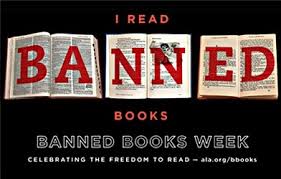 The Krug Memorial Fund awards grants to books that have been banned in various venues.
The Krug Memorial Fund awards grants to books that have been banned in various venues.
Here’s more from the press release.
Seven organizations, ranging from a fine arts organization to an LGBT-focused community library, are recipients of $1,000 grants from the Freedom to Read Foundation’s Judith F. Krug Memorial Fund for events celebrating Banned Books Week this fall.
The grantees for 2014, the sixth year of Krug Fund grants, will feature programs dealing with recent local challenges to books (in Chicago and Charleston, S.C.) and books that have disappeared completely (in Alexandria, Va.); connecting literacy and intellectual freedom (in Nashua, N.H.); and encouraging content creation and interactivity (in Columbus, Ohio). Additionally, this year featured the first grant to an LGBT-focused library—in North Carolina—and a repeat grant to the ACLU of Pittsburgh, Krug’s home town.
As with past years, recipients will provide FTRF with photos, videos and written reports of their events. For past years’ recipients visit www.ftrf.org/?Krug_BBW.
Nashua (N.H.) High School North will integrate a summer reading program, community bookshelf, literacy fundraising night, literature symposium, library registration night and English 1 reading strategy lessons using “To Kill a Mockingbird” and “Call of the Wild” in their project. Additionally, Spanish Honor Society students will organize an Hispanic authors’ literature symposium featuring challenged books by Hispanic authors.
Charleston (S.C.) Friends of the Library takes as its focus the recent challenge by the state legislature to Alison Bechdel’s graphic novel “Fun Home” at the College of Charleston. The Friends group will collaborate with several community organizations to bring Banned Books Week to life at local schools and present a public event featuring censored music and a selection from the stage version of “Fun Home.”
DePaul University Library and DePaul University Center for Writing-based Learning in Chicago also will focus, in part, on a local challenge during a community panel discussion. Additional events are “Pop-up shops” (combining book check-out, a slide show, and a Read-Out) in the student centers and a program on a student-run radio program.
Columbus (Ohio) State Community College will involve students, faculty and staff in creating an online exhibit celebrating the freedom to read. The goal is for participants to “curate their own learning experience;” the project will involve a story recording booth, photo booth, mock trial, film festival and significant social media content.
The Northern Virginia Fine Arts Association will work with the Kate Waller Branch of the Alexandria Public Library to put together a Read-Out, participatory “Library Survivor” game, used (banned) book giveaway and “Burning & Burying”—a lecture about books “so thoroughly suppressed that they have completely disappeared.”
LGBT Center of Raleigh Library will celebrate Banned Books Week for the first year thanks to this grant. Various book clubs associated with the library will hold discussions of LGBT-themed banned and challenged books; there will be an open mic night Read-Out featuring passages from “Two Boys Kissing” and “The Perks of Being a Wallflower”; and they will display of banned and challenged books at the North Carolina Pride Festival, which this year falls during Banned Books Week.
Greater Pittsburgh Chapter of the ACLU of Pennsylvania will host two events: the 19th Annual “FREADom: A Celebration of the Freedom to Read” and the 4th edition of “Banned After Dark.” This is the third Krug Fund grant to support the Pittsburgh ACLU’s popular Banned Books Week festivities, which have proven to be eclectic, fun, and powerful evocations of the dangers of censorship.
The Judith F. Krug Memorial Fund was established after Krug’s death in April 2009. Judith Krug was the founding executive director of the Freedom to Read Foundation. She helped found Banned Books Week in 1982 in her capacity as director of the ALA Office for Intellectual Freedom. The Freedom to Read Foundation began awarding Banned Books Week grants in 2010 and became an official Banned Books Week sponsor in 2012.





